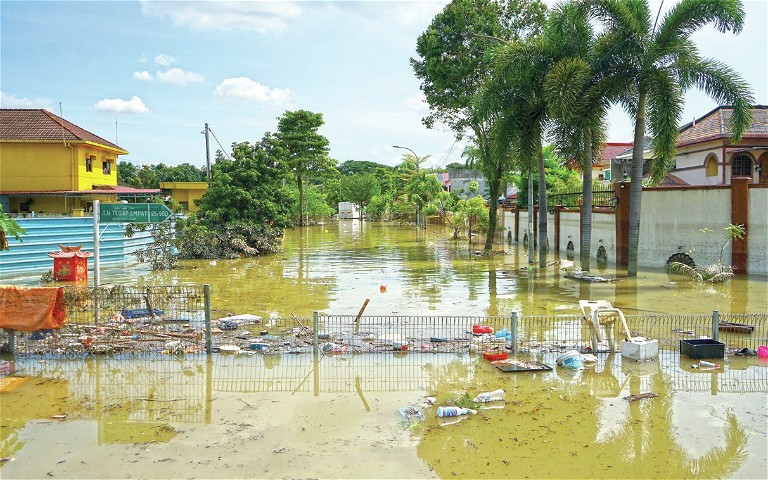Agong urges govt to focus on eradicating hardcore poverty
As such, the existing social protection programme should be strengthened and restructured to face upcoming challenges, the King says
IN PARLIAMENT
by S BIRRUNTHA

THE government needs to focus on eradicating hardcore poverty by 2025 through integrated action with various approaches, Yang di-Pertuan Agong Al-Sultan Abdullah Ri’ayatuddin Al-Mustafa Billah Shah said.
His Majesty said therefore all parties need to mobilise energy and give high commitment so that the living standards of the hardcore poor can be improved through the increase of sustainable income.
“I also welcome the efforts led by the Malaysian Social Protection Council which gives a new dimension in strengthening the country’s social protection system.
“The existing social protection programme should also be strengthened and restructured to face challenges that could affect the quality of life and the potential of future development,” he said in the royal address when officiating the opening of the First Meeting of the Fifth Session of the 14th Parliament yesterday.
At the same time, the King also urged the recovery efforts of micro, small and medium enterprises as well as informal entrepreneurs affected by the Covid-19 pandemic and the flood disaster to be given important and critical attention.
He said special groups such as hawkers and small traders, women, youths, graduates, the bottom 40% income group including asnaf, as well as the unemployed should continue to be assisted through entrepreneurship guidance programmes and appropriate funding for survival.

His Majesty says the country’s disaster management mechanisms need to be constantly improved as environmental degradation and climate change phenomena continues to pose a threat to the world and human wellbeing
Pic by Muhd Amin Naharul
“The digitisation of operations will continue to be strengthened to help local entrepreneurs rise again and contribute to the socioeconomic upliftment of the people as well as the economic development of the country.
“The goal of building a nation of entrepreneurs and making Malaysia a superior entrepreneurial nation will be achieved through initiatives under the National Entrepreneurship Policy 2030,” he said.
On that note, His Majesty urged the recovery of the tourism industry to be implemented immediately to maintain the sustainability of the industry.
He noted that the new postpandemic norm of tourism activities needs to be designed to give the people the opportunity to go on holiday, besides cultivating safe tourism for all.
“To achieve this goal, the focus should not only be given to domestic tourism, but also to explore opportunities to bring back foreign tourists to Malaysia as one of the efforts to further accelerate the recovery of the country’s tourism industry,” he said.
His Majesty added that the new post-pandemic norm of Covid-19 also requires the community to adapt to the empowerment of the digital economy ecosystem across every level of service sectors.
“Therefore, I welcome the government’s efforts to develop the National Digital Network Plan to improve and accelerate the development of the country’s digital infrastructure.
“The implementation of MyDigital through various initiatives, especially through the transformation of the community Internet centre into the Malaysia Family Digital Economy Centre and its expansion to various state legislative assembly constituencies will bridge the digital divide among the community and create new value,” he said.
On that note, the King said the recovery in economic growth, which expanded by 3.1%, proved the effectiveness of eight series of economic assistance and stimulus packages in 2020 and 2021 worth RM530 billion.
He praised the government’s efforts to sharpen and improve the country’s investment and trade performance to generate sustainable economic growth to gain global institutional recognition.
He also expressed confidence that the country’s economy would benefit greatly through regional and international economic free trade agreements which are the backbone of the rule-based multilateral trading system.
The King noted that for 2022, the government aims to provide almost 600,000 job opportunities through the Malaysia Family Employment Guarantee initiative.
He said the government’s move was for the sake of business continuity and the regeneration of economic activities, besides ensuring that Malaysia remains a major exporter and investment destination in the region.
“In addition, the country’s productivity and competitiveness must also be further enhanced to attract quality foreign investment to create high-income employment opportunities for the people,” he noted.
Adding further, His Majesty said all programmes and projects to be implemented under the 12th Malaysia Plan must be completed on schedule.
“To ensure the wellbeing of the rural community, focus must be given to the provision of better and quality rural infrastructure.
“Developmental and economic imbalances between income classes, regions and states as well as between all ethnicities such as Orang Asli and others need to be reduced to ensure that the country’s prosperity is enjoyed by all fairly,” he added.
He also raised the need to provide comfortable and conducive housing for all Malaysians.
The provision of shelter should be expanded through the provision of assistance to build new and repair old houses, especially to the poor and less fortunate so that they can live a more prosperous life.
Apart from that, His Majesty also stressed that the country’s disaster management mechanisms need to be constantly improved as environmental degradation and climate change phenomena continues to pose a threat to the world and human wellbeing.
He said, to face uncertainty in the future, disaster management must involve cross-social roles and responsibilities including government, private, NGOs and volunteers, especially among the youths as well as the common people.
At the same time, he said coordination between the federal government, state governments and local authorities needs to be implemented on an ongoing basis.
“The development of a centralised disaster warning system and the improvement of drainage systems, especially in densely populated areas, especially in locations at high risk of disasters, also need to be further intensified,” he said.